

Why you stink at fact-checking. The kilogram is dead; long live the kilogram. Nearly every measurement of weight you’ve ever made, from peeking at your bathroom scale to measuring out flour for a recipe, can be traced back to just a single object: a metal kilogram made of platinum and iridium that resides under lock and key in an underground vault in Paris. It’s called the International Prototype Kilogram, or IPK, and since its creation in 1889 it has been the standard by which the world’s weights are defined. But not for much longer. Copies of the IPK are distributed around the world, with countries then creating their own reference weights, as close to the original as possible. These, in turn, are used to calibrate scales and weights throughout every section of society, from labs and factories to supermarkets and bakeries. Are you a Positive Deviant? Cognitive Biases and the Human Brain. I am staring at a photograph of myself that shows me 20 years older than I am now.
I have not stepped into the twilight zone. Rather, I am trying to rid myself of some measure of my present bias, which is the tendency people have, when considering a trade-off between two future moments, to more heavily weight the one closer to the present. A great many academic studies have shown this bias—also known as hyperbolic discounting—to be robust and persistent. To hear more feature stories, see our full list or get the Audm iPhone app. The internet: is it changing the way we think? Every 50 years or so, American magazine the Atlantic lobs an intellectual grenade into our culture.
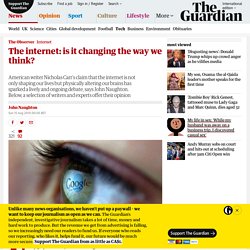
The vain brain. On the matter of the correct receptacle for draining spaghetti, my husband demonstrates a bewildering pigheadedness.
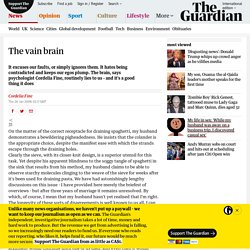
He insists that the colander is the appropriate choice, despite the manifest ease with which the strands escape through the draining holes. Clearly the sieve, with its closer-knit design, is a superior utensil for this task. The Practical and the Theoretical. The Stone is a forum for contemporary philosophers and other thinkers on issues both timely and timeless.
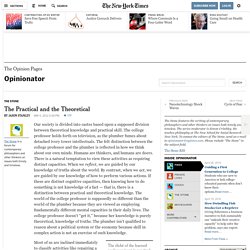
Our society is divided into castes based upon a supposed division between theoretical knowledge and practical skill. The college professor holds forth on television, as the plumber fumes about detached ivory tower intellectuals. The felt distinction between the college professor and the plumber is reflected in how we think about our own minds. Humans are thinkers, and humans are doers. There is a natural temptation to view these activities as requiring distinct capacities. Asimov - The Relativity of Wrong. The Skeptical Inquirer, Fall 1989, Vol. 14, No. 1, Pp. 35-44.
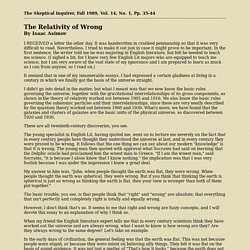
Simplicio and Sophisticus. S Use of Your Data. Lera Boroditsky: How language shapes the way we think. Pythagoras on the Purpose of Life and the Meaning of Wisdom. How Helping Students to Ask Better Questions Can Transform Classrooms. To get started with the QFT, first give students time to develop as many questions as they can, with the instruction not to worry if it’s a “good or bad” question. The only requirement is that they be questions, not statements. After the initial fast brainstorm, talk about the difference between closed and open questions, discussing the advantages and disadvantages of both. Then ask students to categorize their questions as “open” or “closed.” The next step is to ask students to change some of their questions from open to closed and vice versa. “It’s in the working with the questions that something happens,” said Rothstein, co-director of The Right Question Institute, during a session at the Building Learning Communities conference.
After working with questions they developed in this way, ask students to pick their best three questions. After producing, improving and strategizing about their questions, the last step is to reflect upon the experience of asking and modifying questions. Are Blade Runner’s Replicants “Human”? Descartes and Locke Have Some Thoughts. “You’re in a desert, walking along in the sand, when all of a sudden you look down and you see a tortoise … You reach down and you flip the tortoise on its back.
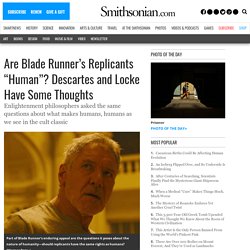
What Happens When We Reach the Limits of Science? Albert Einstein said that the ‘most incomprehensible thing about the Universe is that it is comprehensible’.
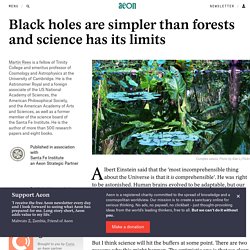
He was right to be astonished. Human brains evolved to be adaptable, but our underlying neural architecture has barely changed since our ancestors roamed the savannah and coped with the challenges that life on it presented. It’s surely remarkable that these brains have allowed us to make sense of the quantum and the cosmos, notions far removed from the ‘commonsense’, everyday world in which we evolved.
But I think science will hit the buffers at some point. There are two reasons why this might happen. Scientific knowledge is actually surprisingly ‘patchy’ – and the deepest mysteries often lie close by. TOK RESOURCE.ORG. Why Science Tells Us Not to Rely on Eyewitness Accounts. IN 1984 KIRK BLOODSWORTH was convicted of the rape and murder of a nine-year-old girl and sentenced to the gas chamber—an outcome that rested largely on the testimony of five eyewitnesses.
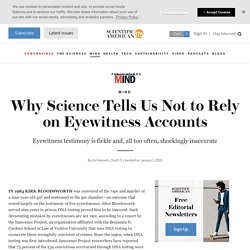
After Bloodsworth served nine years in prison, DNA testing proved him to be innocent. Such devastating mistakes by eyewitnesses are not rare, according to a report by the Innocence Project, an organization affiliated with the Benjamin N. Cardozo School of Law at Yeshiva University that uses DNA testing to exonerate those wrongfully convicted of crimes. Since the 1990s, when DNA testing was first introduced, Innocence Project researchers have reported that 73 percent of the 239 convictions overturned through DNA testing were based on eyewitness testimony. One third of these overturned cases rested on the testimony of two or more mistaken eyewitnesses.
Surveys show that most jurors place heavy weight on eyewitness testimony when deciding whether a suspect is guilty. Read more from this special report: Tuskegee Bioethics Center - Tuskegee Study and Health Benefit Program - CDC - NCHHSTP. Tuskegee Study, 1932-1972 Nearly 65 years after the U.S.
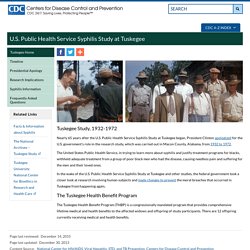
Public Health Service Syphilis Study at Tuskegee began, President Clinton apologized for the U.S. government's role in the research study, which was carried out in Macon County, Alabama, from 1932 to 1972. The United States Public Health Service, in trying to learn more about syphilis and justify treatment programs for blacks, withheld adequate treatment from a group of poor black men who had the disease, causing needless pain and suffering for the men and their loved ones. 6 Critical Thinking Questions For Any Situation - 6 Critical Thinking Questions For Any Situation by TeachThought Staff While it’s true that critical thinking is a foundation rather than a brick, how you build that foundation depends on the learning process itself: exposing students to new thinking and promoting interaction with that thinking in a gradual release of responsibility approach.
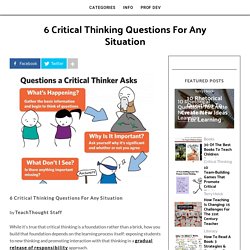
The following graphic from learningcommons is most useful for its universal applicability via its simplicity–six basic questions that characterize critical thinking. The questions are general enough that they can be used with almost anything–different age groups, content areas, and various learning contexts. How to Structure a Theory of Knowledge Essay. How to Structure a Theory of Knowledge (TOK) Presentation. The following Theory of Knowledge (TOK) presentation structure has been designed very carefully. Core tok.